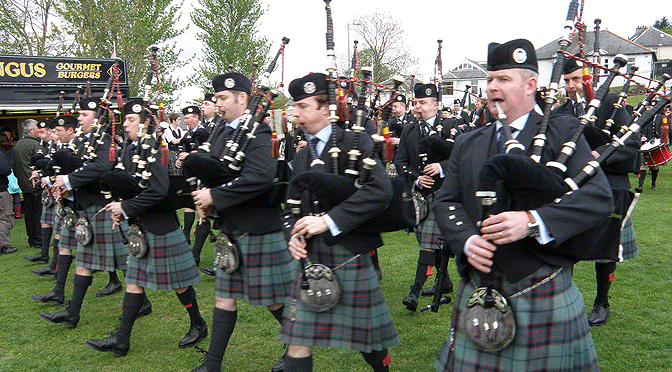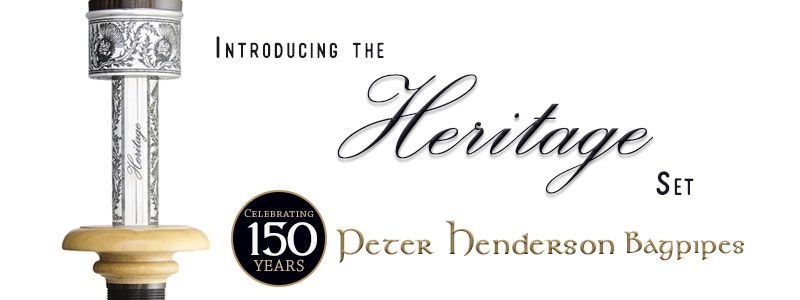The following is from the Pipe Band Magazine of October 2008 and was written by the then senior adjudicator Alistair Aitken in his ‘Judge’s Journal’ column for the magazine. The article was headlined: ‘Burst Bags and Drumskins – Adjudicator Experiences Over the Summer ‘:
‘Since the last edition of the magazine the competition season, including Major Championships, has been in full swing. Inevitably the unexpected tends to happen when things seem to be going well (Murphy’s Law), and these circumstances can often have implications for adjudication or, more likely, can attract criticism of Adjudicators. The British Pipe Band Championships in Birmingham, in particular, encountered some examples of such situations, all three of which happening in the Grade 1 competition. Firstly, the Robert Wiseman Dairies Vale of Atholl Pipe Band was disqualified for playing a wrong tune and then the Leading Drummer of the Scottish Power pipe band’s drum head burst on the start line. Most controversial, however, was the Pipe Major of the Field Marshal Montgomery Pipe Band (pictured above) encountering a burst pipe bag as soon as he blew up his pipes during the introduction to the band’s performance.
‘In the first situation, although unfortunate, the disqualification was unavoidable and fully in accordance with the RSPBA’s competition rules as a mistake had been made in submitting an incorrect tune in the band’s entry form. In this instance the responsibility of the Adjudicators was simply to be aware whether the band was playing the tunes as specified in the competition programme. RSPBA Adjudicators have no role in disqualifying a band for any reason. That responsibility lies solely with the RSPBA National Council official.
 ‘In the case of the burst drum Scottish Power (above) were not disqualified as the drum was simply swapped on the starting line with that of another player in the band, who played the burst drum throughout the performance. This obviously ran the risk of impacting on the performance in some way (e.g. sound quality/distortion, tonal balance, integration etc) and it was the responsibility of the Drumming Adjudicator, and arguably to a lesser extent the Ensemble Adjudicator, to take this into account in their assessment and their final placings.
‘In the case of the burst drum Scottish Power (above) were not disqualified as the drum was simply swapped on the starting line with that of another player in the band, who played the burst drum throughout the performance. This obviously ran the risk of impacting on the performance in some way (e.g. sound quality/distortion, tonal balance, integration etc) and it was the responsibility of the Drumming Adjudicator, and arguably to a lesser extent the Ensemble Adjudicator, to take this into account in their assessment and their final placings.
‘The controversial incident was the Field Marshal one, as in reality one piper did not play for the whole performance. The situation was perhaps compounded by the fact that one Adjudicator did not see the incident and placed the band first. The other Piping Adjudicator did see the incident and deemed that it should result in the band being placed last. The Ensemble Adjudicator also saw the incident but took a more lenient view of the effect on the overall performance and placed the band fourth. The end result was that the band finished sixth in the competition which attracted claims of unfairness and adjudicator incompetence.
‘To avoid any doubt about the outcome of the Field Marshal incident, it was dealt strictly in accordance with the RSPBA’s Constitution and Rules. Rule 3.57 states that:
‘If during a performance the band plays with less than the requisite number of players the band will be disqualified.’
‘The minimum numbers for a Grade 1 Pipe Band taking part in a Major Championship (as defined in Rule 3.55) are 8 Pipers, 3 Snare Drummers and one Bass Drummer. The Field Marshal Pipe Band vastly exceeded these numbers and consequently it was not within the powers of the RSPBA National Council to disqualify the Band when one piper did not play after the band performance had started. The responsibility then fell to the Adjudicators involved to take account of the effect of the incident on the Band’s performance in their assessment and placings. For such situations RSPBA Adjudicators are expected to follow guidance set out in the official Adjudicators’ Code of Practice. The guidance states:
‘In the event of instrument failure (e.g. burst drum or burst pipe-bag) which results in a member or members of the band stopping playing, the circumstances should be noted on the Critique Sheet by the Adjudicator and reported to the National Council representative. In such situations Adjudicators should continue to evaluate the performance taking into account the loss of the player/players. When band members continue to play with defective instruments, Adjudicators should take this into account in assessing the performance in terms of tone, band balance and general integration. Particular reference to such circumstances should be made in the Critique Sheet and taken into account in placings allocations.’
‘It could of course be argued that the RSPBA procedures require to be reviewed. That would be a matter for the RSPBA Music Board and National Council to consider. There is no doubt, however, that the incident was dealt with exactly in accordance with the existing RSPBA rules.
‘There was also some criticism at a public event this year about the limitations placed on RSPBA Adjudicators regarding commenting on or criticising the selection of tunes or format of tunes for competition performances, particularly in relation to medley construction. There appears to be a view among Bands that Adjudicators are restricted by RSPBA rules from commenting on such aspects.
‘It should be clear that there are no restrictions on Adjudicators in this territory. One of the key roles of the Adjudicator is to assess the musical effect of the particular discipline he or she is assessing (i.e. Piping, Drumming or Ensemble). If this is affected by tune selection or the way in which selected tunes are linked together there is nothing to prevent Adjudicators from commenting on such matters in their written assessments, particularly in an advisory capacity. Rule 3.72, however, does specifically state that Adjudicators ‘shall not condemn a Band on the setting of a tune.’



















Recent Comments